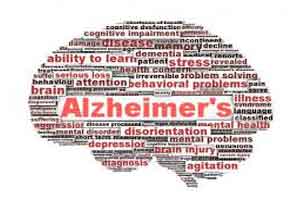- Home
- Editorial
- News
- Practice Guidelines
- Anesthesiology Guidelines
- Cancer Guidelines
- Cardiac Sciences Guidelines
- Critical Care Guidelines
- Dentistry Guidelines
- Dermatology Guidelines
- Diabetes and Endo Guidelines
- Diagnostics Guidelines
- ENT Guidelines
- Featured Practice Guidelines
- Gastroenterology Guidelines
- Geriatrics Guidelines
- Medicine Guidelines
- Nephrology Guidelines
- Neurosciences Guidelines
- Obs and Gynae Guidelines
- Ophthalmology Guidelines
- Orthopaedics Guidelines
- Paediatrics Guidelines
- Psychiatry Guidelines
- Pulmonology Guidelines
- Radiology Guidelines
- Surgery Guidelines
- Urology Guidelines
Women's better verbal memory skills may mask early signs of Alzheimer's

Women may have better verbal memory skills than men even when their brains show the same level of problems metabolizing glucose, which occurs in people with Alzheimer's disease, according to research published in the Online issue of Neurology®, the medical journal of the American Academy of Neurology.
"Women perform better than men on tests of verbal memory throughout life, which may give them a buffer of protection against losing their verbal memory skills in the precursor stages of Alzheimer's disease, known as mild cognitive impairment," said study author Erin E. Sundermann, PhD, of the University of California, San Diego, who conducted the research while at Albert Einstein College of Medicine in Bronx, NY. "This is especially important because verbal memory tests are used to diagnose people with Alzheimer's disease and mild cognitive impairment, so women may not be diagnosed until they are further along in the disease."
The study included people from the Alzheimer's Disease Neuroimaging Initiative: 254 people with Alzheimer's disease, 672 people with mild cognitive impairment that included memory problems and 390 people with no thinking or memory problems. Participants' verbal memory skills were tested and PET brain scans measured how well their brains metabolized glucose, which is the primary energy source for the brain. Poor metabolism is a sign of dysfunction in brain cells.
The memory test asked participants to remember a list of 15 words read to them, both right away and 30 minutes later. Women scored better than men on the memory tests when they had no, mild or moderate problems with brain metabolism. Once the participants had more advanced metabolism problems, there was no difference in test scores between women and men.
"These results suggest that women are better able to compensate for underlying changes in the brain with their 'cognitive reserve' until the disease reaches a more advanced stage," Sundermann said.
The immediate recall test has a maximum score of 75; memory is considered impaired when scores are less than 37. The study looked at a rate of glucose metabolism in the temporal lobe (brain area responsible for memory function) relative to glucose metabolism in the pons/cerebellum (brain area where metabolism remains stable with increasing age and pathology). This temporal lobe glucose metabolism rate ranges from one to four, with lower scores indicating more dysfunction in brain cells.
In the study, women reached the impaired scores at a lower metabolism rate than men, or a temporal lobe glucose metabolism rate of 2.2 compared to 2.6. The delayed recall test has a maximum score of 15 and scores of less than eight are considered impaired. Women in the study had impaired scores at a glucose metabolism rate of 2.9 compared to 3.7 for men.
"If these results are confirmed, adjusting memory tests to account for the differences between men and women may help diagnose Alzheimer's disease earlier in women," Sundermann said.
Sundermann said limitations of the study include that it was a snapshot in time, with one set of tests and images that do not show changes over time, and that most of the participants were white and well educated, so the results may not be relevant to the overall population.

Disclaimer: This site is primarily intended for healthcare professionals. Any content/information on this website does not replace the advice of medical and/or health professionals and should not be construed as medical/diagnostic advice/endorsement or prescription. Use of this site is subject to our terms of use, privacy policy, advertisement policy. © 2020 Minerva Medical Treatment Pvt Ltd